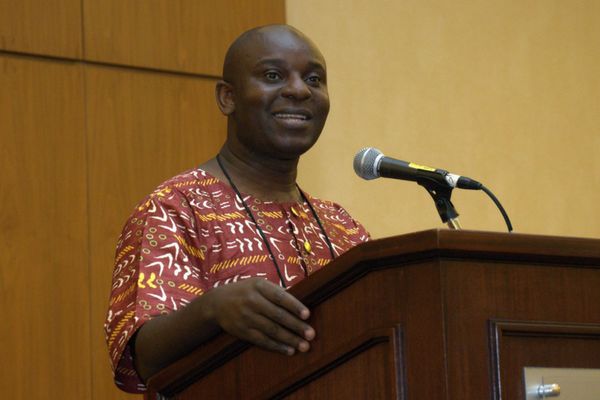Interview with Social Principles revision team leader Rev. Kalaba Chali
The Social Principles are being revised by a global team of theologians and experts. Today we profile the leader leading the team working on the social community section of the Social Principles.

My name:
Kalaba Chali, I go by Chali.
Profession:
I am a United Methodist clergy, serving as the Great Plains Annual Conference as coordinator of mercy & justice ministries, which include all the social engagement and mission work and cross-cultural training for churches and clergy.
My UMC Story:
I have had many roles in The United Methodist Church, going back to the Democratic Republic of Congo where I received my call to ordained ministry, my work with youth/young adult in Zambia and southern Africa. While in seminary in Zimbabwe, I served a church for two years as a student pastor. I came to the U.S. and worked with St. Luke’s UMC in Orlando, Florida, before enrolling at Perkins School of Theology and serving at Lovers Lane UMC, Dallas, Texas, as an associate pastor. In 2010, I moved to Missouri and served two churches until March 2013, when I was recruited in the newly formed Great Plains Annual Conference to serve as the mercy and justice coordinator. I have served as a French interpreter for General Conference and World Methodist Council (2008, 2012 and 2016).
My hope in convening the social community revision team:
I hope to experience the spirit of God through our work together and to grow in my walk with Christ and service through the UMC.
Where in the social community section of the Social Principles do you see our greatest strength as a church?
One of the strongest strengths is the reminder of our communal existence; when one member of the community is excluded or experiences suffering, the entire body shares in their suffering. This section underscores the importance of our communal humanity as people of God.
What difference do the Social Principles make in the life of a congregation or a conference?
It gives members and congregations a toolbox with strong biblical and culturally relevant means to speak out against oppressive systems and to build God’s beloved community.
Where do you see the greatest challenge to revising the social community section of the Social Principles?
Human sexuality is one of those challenges as the worldwide Church continues to discern and struggle on ways to work through this. I also would name the challenge of coming up with principles that are general enough to allow for contextual applications and at the same time not too broad where issues of oppression are merely massaged rather than denounced.
Tell us the three greatest systemic oppressions or injustices facing society where you live today?
The treatment of undocumented people and other minorities, including racial and religious minorities. Affordability and availability of maternal health care, especially for the working poor. People living in poverty in rural communities.
Who are some of your role models and how have you learned from them?
The United Methodist Church both in Africa and in North America (particularly in the U.S.) have helped me grow in my faith journey, but I must name one person, Desmond Tutu, whose ministry of political and racial reconciliations in South Africa and around the world continue to inspire me.